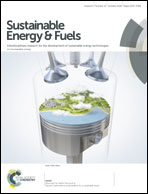Impact of the addition of poly-dihydrogen ruthenium precursor complexes on the hydrogen storage properties of the Mg/MgH2 system†
Abstract
In order to improve the hydrogen storage properties of magnesium hydride, poly-dihydrogen ruthenium complexes have been synthesized in powder form and added to commercial MgH2 by mechanically ball milling (5 h under argon). To reveal the influence of the complexes on the hydrogen absorption/desorption kinetics of the Mg/MgH2 system, microstructural characterization of the prepared mixtures was performed by XRD, SEM, TEM-EDX, NMR and XPS and the hydrogen storage properties measured by TPD, DSC and PCT. The complexes used as additives are precursors to the active species and exhibit two different impacts on MgH2. First, during milling, the resulting coating at the surface of the MgH2 particles prevents the aggregation of the powder. This leads, when compared with pure milled MgH2, to an important reduction of the hydrogen desorption temperature (74 °C) and apparent activation energy of MgH2 decomposition (30%) with the addition of only 5 wt% of the complexes. Second, during sorption cycling, the ruthenium dispersed at the surface of the MgH2 particles greatly impacts the hydriding rates. The hydrogen absorption kinetics of the prepared mixtures, which are able to absorb 6.0 wt% of hydrogen at 200 °C in less than 5 min, are significantly improved in comparison with those of the pure milled sample.



 Please wait while we load your content...
Please wait while we load your content...